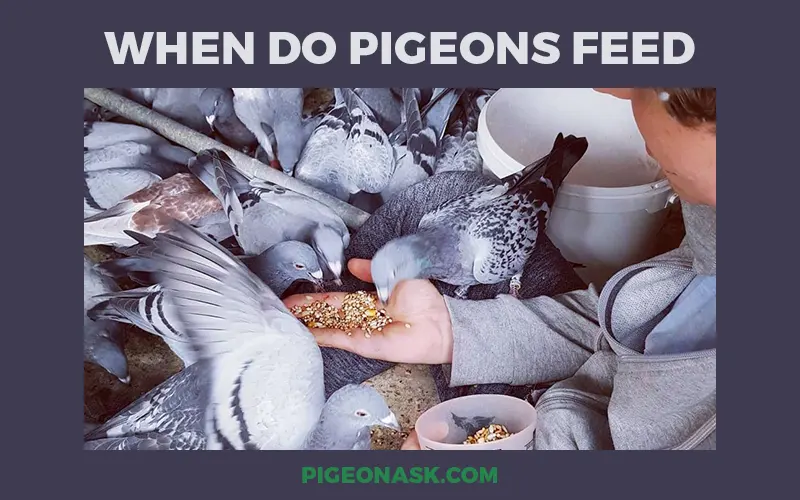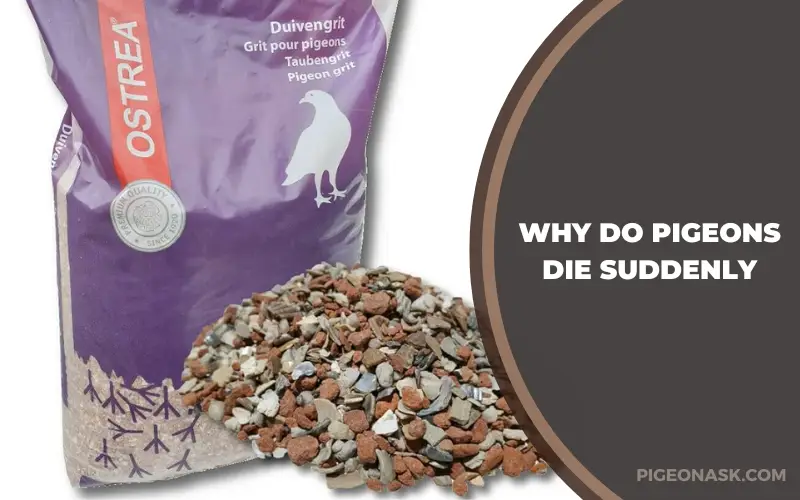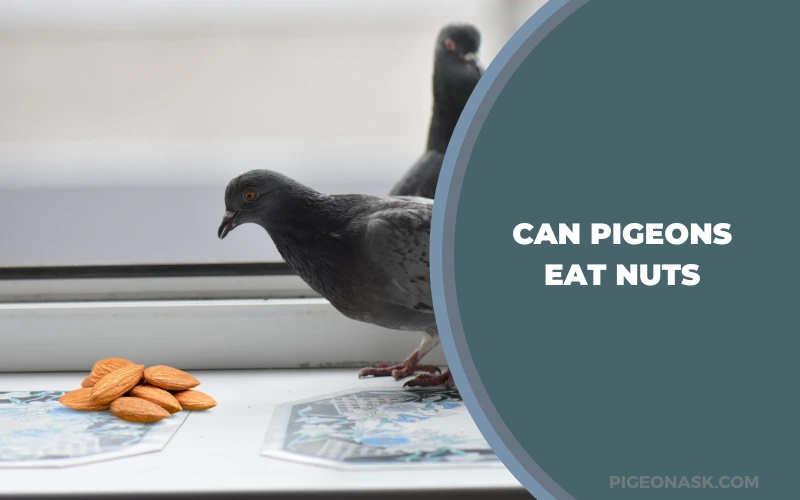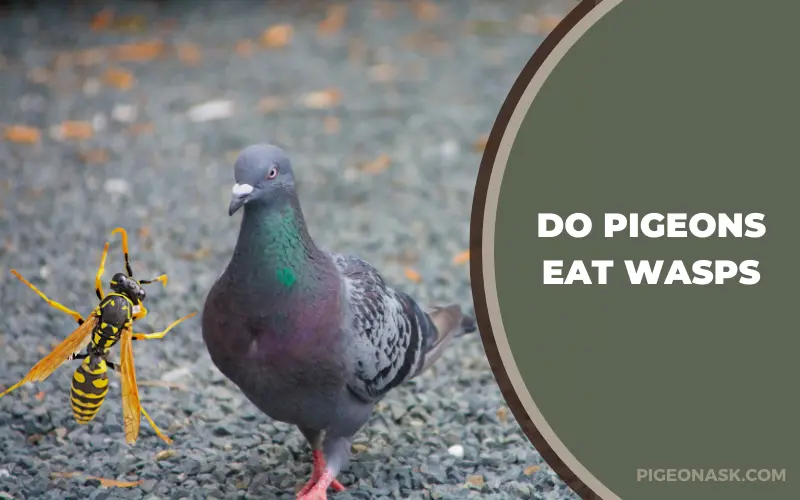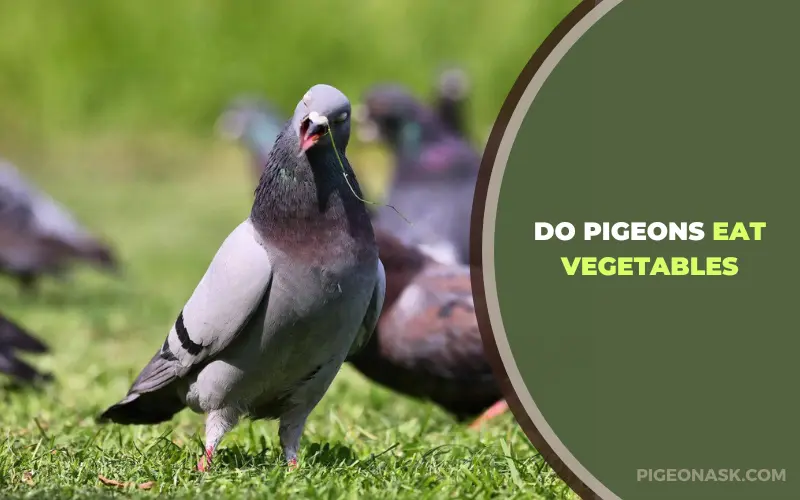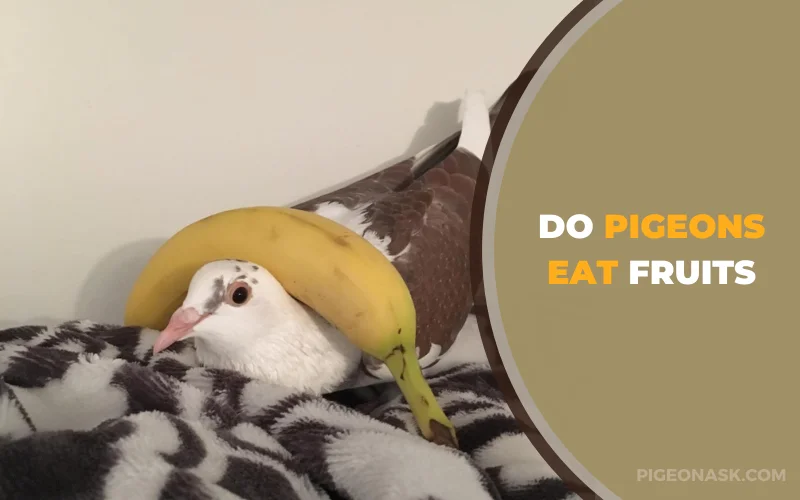Pigeon Foods And Diet
Pigeons are beloved birds recognizable by their iridescent plumage. Their versatile palates lead them to forage on a diverse diet. This typically consists of seeds, grains, berries, herbs, leafy greens, fruits, and small invertebrates like insects and worms. The array of foods pigeons consume allows them to thrive in urban and rural environments alike. Their resourcefulness and distinctive appearance explain their widespread appeal.
Who does not love pigeons because of their beautiful feathers as well as their mysterious food menu?
Generally, seeds, grains, berries, weeds, herbs, leafy greens, fruits, insects, worms, etc. are included as pigeon food.
Everyone has heard about the ancient saying; pigeons will explode if they are fed raw rice. Even if this is incorrect, pigeons should have specific food guidelines, and there are certain foods they should avoid.
Let’s uncover the fabulous food habits of pigeons that will raise your excitement!
Pigeons’ Food: What Do They Eat?
In general, the predominating pigeons in our town and urban settings will consume nearly everything.
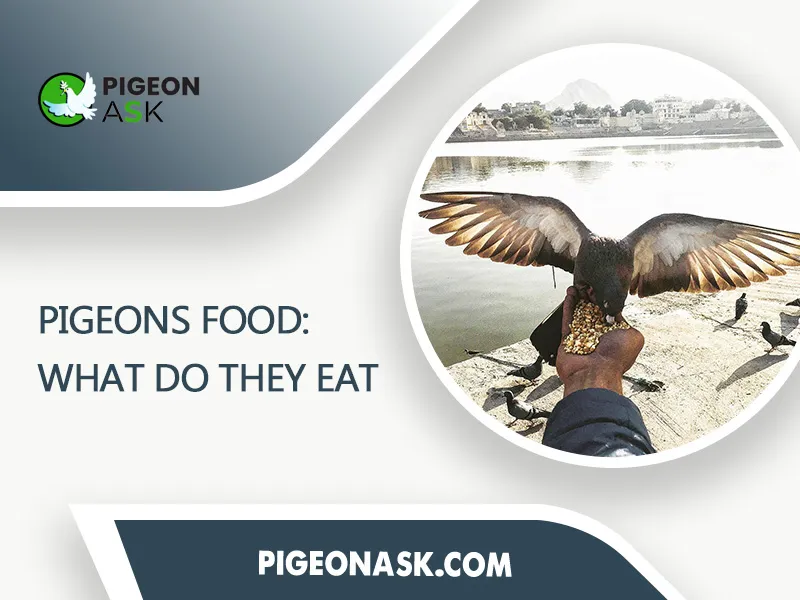
They would discover seeds and grains in their natural habitat. Additionally, eating insects and snails once in a while remains one of the healthiest options, and food scraps that humans discard are also included in this list. Again, we can expand this menu.
Let’s know their dietary list with a little expansion.
Wheat
The cooing group adores this cereal grain, considering it a dietary essential. Wheat is simple to consume and provides a well-balanced set of essential nutrients in their food.
Wheat has oil, fiber, and protein in every little seed. There are also the minerals sulfur, manganese, niacin, and phosphorus. Pigeons prefer crunchier wheat grains, but wheat should be combined with other nutrient choices and has a ratio of fat-to-protein.
Corn
For certain pigeons, corn is another primary diet, and they seem to like it. It has the perfect balance of fat, fiber, and protein; but eating excessive maize can quickly cause weight problems.
Corn provides insulation, potassium, magnesium, B1, C and B9 vitamins, and is a favorite food for pigeons. Uncooked corn grains are acceptable but avoid butter, salt, and crushed corn for health reasons.
Sorghum
These round, white, or red grains in birdseed, known as sorghum or milo, are not a favorite for pigeons but will eat sorghum if it’s available. Sorghum gives instant energy with carbs, a bit of fiber, calcium, and iron, but it’s not very nutritious.
However, relying too much on sorghum can cause nutrient problems because it’s mostly a filler and lacks essential nutrients.
Oats
Pigeons love eating these protein-rich oats, especially during their breeding time. The protein helps the chicks to grow up. Moreover, carbs and fat give energy to both the parents and their babies.
Oats, rich in magnesium, thiamin, and phosphorus, are beneficial for racing pigeons’ bone health and neural function. But oats should not exceed 5% of their diet.
Barley
Pigeons frequently eat barley, however, it’s not their preferred grain. In fact, some people view this grain more as a digestive aid than as a meal because of its high content of indigestible fiber. But it doesn’t lack any nutritional value.
Vitamin B6, potassium, iron, magnesium, and a trace amount of calcium are included in the digestible fraction.
Rice
Pigeons can safely consume uncooked rice, as they can digest it. But the amount of nutrients is minimal, despite the misconception that raw rice would cause death.
Rice is mostly carbohydrates, but lacks essential nutrients like calcium, fiber, iron, protein, and vitamin B6 for pigeons. While cooked rice is slightly better, pigeons will eat raw rice if there is nothing else available.
Peas
Pigeons love peas, and they’re recommended as a tasty and nutritious meal. These are easy for pigeons to eat and provide them with good nutrition.
Peas are rich in vitamins like B-6, K, C and A. Also, peas offer low amounts of magnesium, iron, manganese, calcium, and folate.
Leafy Greens
Greens, naturally, offer numerous nutrients, including omega-3, and omega-6 fatty acids, antioxidants, vitamin C, vitamin K, and calcium.
Pigeons can maintain adequate calcium levels and hydration by consuming greens like kale, cabbage and spinach.
Snails
Pigeons occasionally consume snails during breeding, to obtain extra protein and minerals. And they eat snails or insects when they find them because they are flexible in their food choices.
Snail flesh contains proteins, iron, calcium, lipids, magnesium, zinc, phosphorus, vitamins like B6, K, A and B-12, folate, and amino acids. The shell, rich in calcium carbonate, aids digestion in pigeons.
How Do Urban Pigeons Manage Their Foods?
Pigeons can nest, flourish and feed in our bustling cities and towns because they have adjusted to our urban neighborhoods rather well.
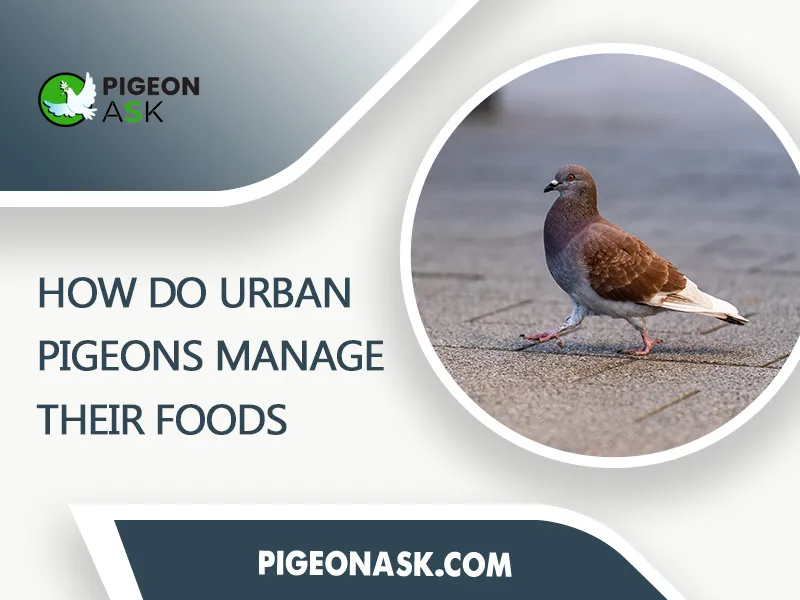
Urban pigeons consume nearly anything, including food scraps that humans discard or drop. They survive on anything they can discover; this comprises:
- Pasta
- Fish and meat
- Bread
- Pulses and cereals
- Confectionary items (sweets, chocolates, etc.)
Decades of evolution and adaptation have allowed these varieties of pigeons to eat the things that we also eat. Pigeons are frequently observed foraging through trash cans in times of extreme hunger.
This is usually quite harmful to them because they are probably consuming potentially lethal tainted food.
What Are the Dietary Habits of Wild Pigeons?
Wild pigeons can enjoy significantly healthier food than urban pigeons do. Since wild pigeons usually inhabit woodlands and coastal regions, their only source of food is what the natural world offers.
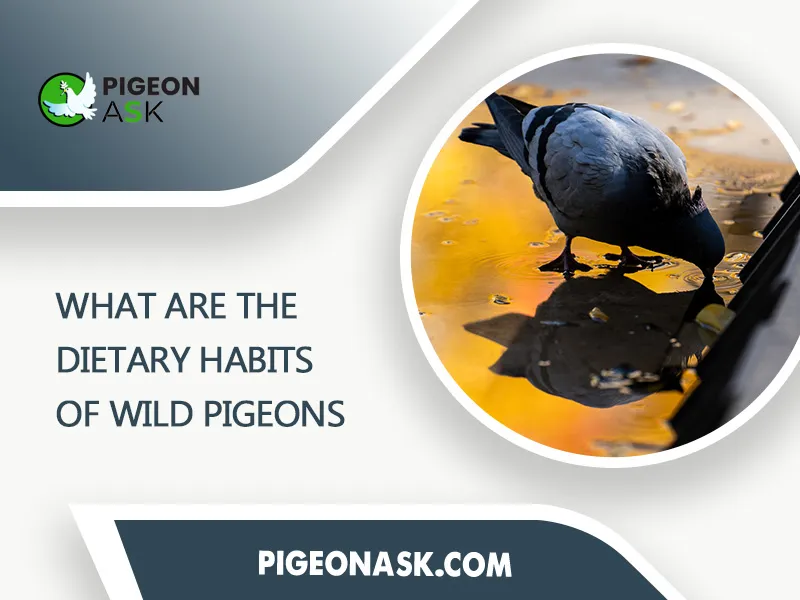
The most typical foods that they will be able to get hold of are:
- Berries
- Nuts
- Grains
- Seeds
- Grit (for digestion)
- Vegetables
- Plants and vegetation
- Insects
- Fresh water
Wild pigeons, although herbivores, sometimes eat lizards, insects, and spiders when hungry. To stay healthy, they need fat and protein, found in fruits, nuts, or other critters.
What Do Baby Pigeons Eat?
Here is the most wonderful thing you are going to discover. Yes, pigeons crop milk for their babies. Pigeons may experience a protein shortage if they cannot obtain macronutrients as babies or newborns.
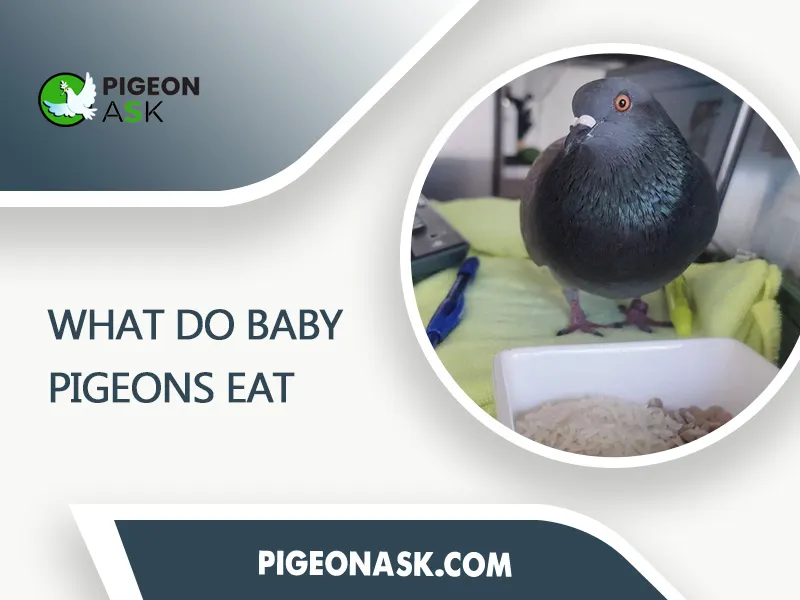
And their only source of nutrition is the milk that their parents produce. Both genders of pigeons secrete this unique kind of milk, which is called crop milk. The duration of this special feeding procedure is no longer than a week.
It is unlikely that young pigeons will live without the vital nutrients that come from their parents’ crop milk.
What Winter Foods Do Pigeons Eat?
We have known about pigeons’ usual food. Now you must be curious about pigeon’s winter food! So, what are the foods that pigeons consume in winter?
Generally speaking, pigeons adjust to the shifting weather. During the winter, pigeons mostly rely on eating tiny insects and seeds to survive. All year long, pigeons consume seeds and grains which we have already learned.
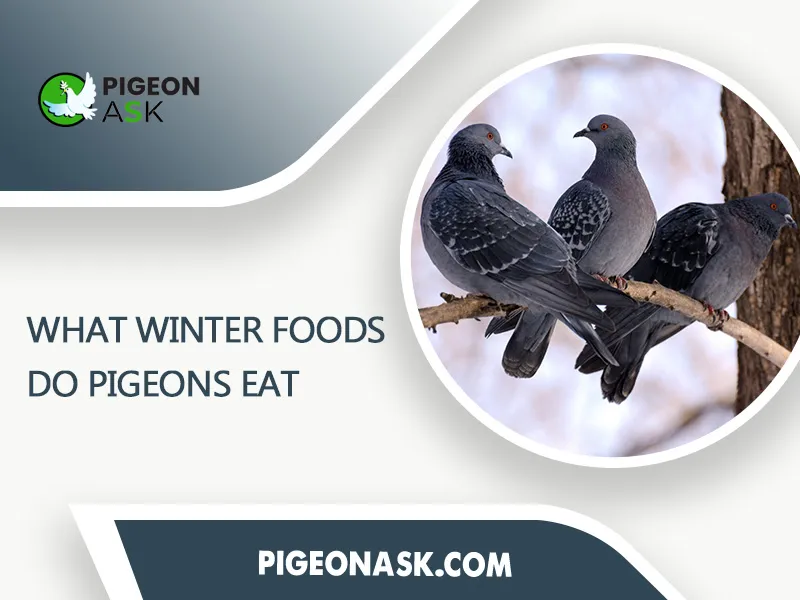
But, in colder climates, they mostly consume seeds and oil-based cereals, such as sunflower, flax, barley, and oats. Suet is also a high-fat food that can be healthier for pigeons during winter.
Are There Foods Pigeons Should Avoid Eating?
After looking at the foods of pigeons, let’s move on to what they should not.
Some foods are unhealthy or dangerous for pigeons and ought to be avoided completely. Pigeons and humans have different digestive systems, so avoid giving pigeons fish, cheese, meat, or processed foods. Also, don’t feed them fruits with pits or seeds as they may pose choking risks.
For their drink, you should provide them with only water. Pigeons can’t digest juice, milk or caffeine, which can be fatal.
Likewise, avoid giving them avocados, chocolates, or anything with xylitol. Because these can be harmful and even lead to serious health issues or even death.
Frequently Asked Questions
More curious about pigeon’s food? Find answers to common questions about these feathered friends below!
01. What Kind of Bird Food Can I Give to My Pigeons?
Pigeons love seeds, so offer them high-quality bird seeds. Always buy bird seeds from specialists to ensure safety, as supermarket seeds can be pricey and not bird-tested. Providing them with quality bird food is important.
So, choose a trusted bird food supplier to guarantee the well-being of the pigeons you feed.
02. Can I Give Sunflower Seeds to My Pigeon?
Yes. Sunflower seeds contain high fat. That is why you should give them a specific amount of it. Excessive amounts of foods that are high in fat can be harmful to their health.
Finally, you are aware of the specifics of a pigeon’s food, everything is clear. I have already included what you should feed and what you should avoid. Given that pigeons’ foods are often similar to those of many other common birds, I hope this information will not surprise you.
Make sure to check this article again to secure the food you’re about to offer your pigeon. That food should not be in the lineup of toxic foods, that’s all.

